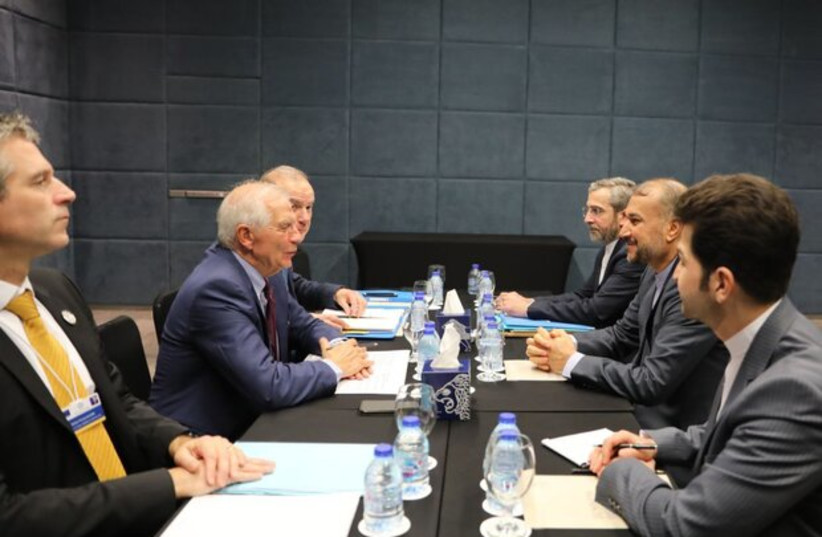Iran's foreign minister met with European Union official negotiators to the revival of the 2015 nuclear deal on the Jordan shores of the Dead Sea on Tuesday as Tehran called for resuming the stalled talks.
"We are willing to restart the [nuclear] talks as soon as possible," Iran's UN ambassador, Amir Saeid Iravani told the United Nations Security Council Monday afternoon in New York.
He spoke in advance of the second meeting of the Baghdad Conference for Cooperation and Partnership hosted by Jordan's King Abdullah.
Participants include Iranian Foreign Minister Hossein Amirabdollahian and European Union foreign policy chief Josep Borrell, who arrived with EU envoy Enrique Mora who has coordinated the Vienna-based talks to revive the deal known as the Joint Comprehensive Plan of Action (JCPOA).
Iran's official IRNA news agency reported that Amirabdollahian and nuclear negotiator Ali Bagheri Kani already met with Borrell and Mora.

French President Emmanuel Macron, whose country is a signatory to the deal, is also scheduled to be at the conference.
Regional participating countries include Turkey, Egypt, Bahrain, the United Arab Emirates, Saudi Arabia, Iraq, Kuwait and Oman.
Talks to restore JCPOA stalled since September
Talks to restore Iran's 2015 nuclear accord, known as the Joint Comprehensive Plan of Action have been at a stalemate since September. Western powers accuse the Islamic Republic of raising unreasonable demands after all sides appeared to be nearing a deal.
Borrell said last week there was no better option than the nuclear accord to ensure Iran does not develop nuclear weapons, adding that "we have to continue engaging as much as possible in trying to revive this deal."
At the UNSC on Monday, an EU representative echoed that statement, explaining that the JCPOA was still the best option to prevent a nuclear Iran.
Iravani told the UNSC that Iran would be willing to restart talks without any "conditions in order to finalize the existing text that will allow all parties to return to full compliance with their obligation under the deal."
Deputy US Ambassador Robert Wood said that "Iran's extraneous demands are the reason why there has not been a return to compliance with the JCPOA."
Iran "has rejected all compromise proposals, the ball is not in the US court on the contrary, the ball is in Iran's court," Wood emphasized.
He spoke during a UNSC discussion of the 2015 Resolution 2231, which supported the JCPOA. The Trump administration withdrew from the JCPOA in 2018. US President Joe Biden sought unsuccessfully to revive it when he entered office in 2021.
Iravani said the Biden administration's "rigid" and "unrealistic" approach has led to the current situation, adding that all of Tehran's demands were within the framework of the original deal.
Wood said that "in September, a deal was within reach – one to which all other participants in the negotiations had agreed." Signatories to the deal aside from the US and France are Germany, Great Britain, Russia and China.
"At the last minute, Iran made new demands that were extraneous to the JCPOA and that it knew could not be met," Wood said.
"This was not the first time Iran’s leaders had turned their backs on a deal that was on the table, approved by all. But this last instance dashed our collective hope for a swift, mutual return to full implementation of the JCPOA.
"We have made clear that the door for diplomacy remains open. Unfortunately, Iran’s actions suggest this goal is not their priority.
"Iran’s conduct since September – notably its repeated and longstanding failure to cooperate with the IAEA and the expansion of its nuclear program for no legitimate civilian purpose – reinforce our skepticism about Iran’s willingness and capability of reaching a deal and explains why there have been no active negotiations since then," Wood said.
Reuters contributed to this report.
